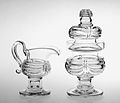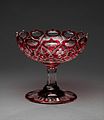Libbey Incorporated
 | |
| Formerly |
|
|---|---|
| Company type | Public |
| ISIN | US5298981086 |
| Industry | Glassware manufacturing |
| Founded | February 6, 1818 |
| Founder | Edward Drummond Libbey |
| Headquarters | 300 Madison Avenue, , United States |
Number of locations | 7 facilities, including headquarters (FY 2018) |
Key people | |
| Brands |
|
| Revenue |
|
| |
| |
| Total assets |
|
Number of employees | 6,083 (FY 2018) [1] |
| Website | https://libbey.com |
Libbey, Inc., (formerly Libbey Glass Company and New England Glass Company) is a glass production company headquartered in Toledo, Ohio. It was originally founded in 1818 in Cambridge, Massachusetts, as the New England Glass Company, before relocating to Ohio in 1888 and renaming to Libbey Glass Co. After it was purchased in 1935, it operated as part of the Libbey-Owens-Ford company and as a division of the Owens-Illinois glass company until 1993, when it was separated back into an independent company.[2]
The company manufactures a number of glassware products, primarily tableware, drinkware and stemware. Historically, it was also involved in producing other types of glass products, such as automotive glass, glass drinking bottles, and light bulbs.
History
[edit]New England Glass Company (1818–1892)
[edit]
The New England Glass Company was originally founded in Cambridge, Massachusetts, by Amos Binney, Edmund Munroe, Daniel Hastings, and Deming Jarves on February 16, 1818. The company produced both blown and pressed glass objects in a variety of colors, which had engraved, cut, etched, and gilded decorations. The firm was one of the first glass companies to use a steam engine to operate its cutting machines, and it built the only oven in the country that could manufacture red lead, a key ingredient in the making of so-called flint glass. By the middle of the nineteenth century, the New England Glass Company was considered one of the leading glasshouses in the United States, best known for its cut and engraved glass.[3][4]
At its start, the company occupied a disused East Cambridge warehouse erected by the recently failed Boston Porcelain and Glass Company. It was fitted with two flint furnaces, 24 steam-operated glass-cutting mills, and a red-lead furnace, which in combination could produce many types of plain, molded, and cut glass.[5] The company charter permitted it to manufacture "flint and crown glass of all kinds in the towns of Boston and Cambridge." At that time, about 40 glass factories existed in the United States, though most had few employees. Deming Jarves held one key advantage over his competitors in the glass manufacturing business; he held the American monopoly on red lead (litharge), which was essential for the production of fine lead glass. In 1826, however, Jarves left to found the Boston and Sandwich Glass Company.[3][6]
Through the 1820s, the company exhibited at the American Institute Fair, won a Franklin Institute award for "skill and ingenuity," and established agencies in New York, Philadelphia, and Baltimore. The company took full advantage of the introduction of pressed glass and its business grew rapidly. Within 25 years, the glass industry was Cambridge's top employer in 1845 and again in 1855, when two companies, New England and Bay State, each employed more than 500 people. Engraver Louis F. Vaupel (1824–1903), who joined New England Glass in 1856, led its creation in the 1860s and 1870s of high-quality cut and engraved products, including very fine paperweights.[7]
The company flourished as one of America's leading glass manufacturers through the Civil War, but the development of inexpensive soda-lime glass in West Virginia brought a deep decline in sales, which dropped from about $500,000 in 1865 to $232,304 in 1876, when the workforce had been reduced to only 200 laborers. In 1877, the company's directors withdrew from active participation, leasing the property to William Libbey, their agent since 1870.[8]
William L. Libbey took over the company in 1878 and renamed it the New England Glass Works, Wm. L. Libbey & Sons Props. In 1888, William's son, Edward Drummond Libbey, moved the company to Toledo, Ohio.[3][9]
Libbey Glass Company (1892–1935)
[edit]
The company's name was changed to The Libbey Glass Company in 1892, and it became part of Libbey-Owens-Ford for a number of years. During this time the company was involved in the production of automotive glass in its partnership with Ford Motor Company.[10][11][12] The other part of the partnership — between Edward Libbey and inventor Michael Joseph Owens of the Owens Bottle Machine Company — proved valuable, as Owens developed the first automatic manufacturing methods for light bulbs, which, after adapted to manufacture Libbey's glass products, greatly increased the company's production output. Owens' contributions to the automation methods in the glass and bottling industries spread throughout the United States as the popularity of bottled drinks (and glass products as a whole) became more popular and cheaper to produce in the coming decades.[13][14]
Libbey Glass Division, Owens-Illinois (1935–1993)
[edit]This section needs expansion. You can help by adding to it. (April 2019) |
Libbey Glass Company was acquired by Owens-Illinois Glass Company in 1935,[15] but in 1993 it was spun off as an independent company.[16][13]
Libbey Inc. (1993–present)
[edit]In April 1993, Owens-Illinois announced that it would sell the Libbey Glass division for an estimated $225 million. The sale was viewed as a negative sign for the industry, as earlier that year the Libbey-Owens-Ford Co. had considered (but ultimately decided against) moving its headquarters to Monroe, Michigan, while Toledo was still struggling to maintain its status as a significant glass exporter. Libbey would be spun off as an independent company, and would make its initial public offering on the New York Stock Exchange in June 1993.[17][18]
The company marked its 200th anniversary in 2018. In April that year, the Toledo Museum of Art featured a variety of glass artwork from its collection, all produced by Libbey over several decades. The company also hosted an invitation-only event in May that included performances from the Toledo Symphony Orchestra, as well as a public event at the museum.[19]
In March 2019, Libbey announced that it had hired Mike Bauer, the former president of Master Lock Company, to replace Bill Foley as chief executive officer. Foley would retire, but remain as a board chairman.[20][21]
In June 2020, Libbey announced plans to file for Chapter 11 bankruptcy protection as the result of negative financial effects caused by the COVID-19 pandemic.[22][23][24] Prior to the announcement, Libbey had awarded a total of over $3 million in bonuses to its executive staff in an attempt to dissuade them from leaving the company, after having temporarily decreased their pay by 20-25%. This was done in addition to furloughing approximately 50% of its North American workforce and suspending 401(k) matching, among other cost-saving measures.[25] In October 2020, Libbey emerged from Chapter 11.[26] In December 2020, Libbey closed its Shreveport plant putting 450 employees out of work.[27]
Galleries
[edit]New England Glass Company
[edit]-
The glassblowing department of the New England Glass Company, c.1855.
-
Glass-cutting room of the New England Glass Company, c. 1855.
-
Showroom of the New England Glass Company, c. 1855.
-
Display of New England Glass Co., 1876
Products
[edit]-
Sugar bowl and cream pitcher, free-blown glass with applied decoration, 1815–1835
-
Cream pitcher, pressed glass, 1827–35
-
Oil Lamp, pressed and free-blown white opaque glass, 1830–1840
-
New England Glass Company ewer, 1840–1860
-
Kerosene Table Lamp, ca. 1850
-
Girandole, cased and cut blown and engraved glass, 1850–1860
-
Seal, 1850–1870
-
Vase with witch ball, blown glass, 1850–1875
-
Wine glass, blown glass, 1850–80
-
Compote, red-cut-to-clear-glass, 1855–70
-
Hat stand, free-blown silvered glass, 1855–1875
-
Perfume decanter, green cased over colorless lead glass, 1866–70
-
"Wild Rose" Lily vase, blown glass, ca. 1886
-
Covered jar, blown Amberina glass, 1883–1888
References
[edit]- ^ a b c d e "2018 Annual Report" (PDF). Libbey, Inc. 2019-02-27.
- ^ "A City Built of Glass". University of Toledo. Archived from the original on 2018-05-22. Retrieved 2019-05-18.
- ^ a b c "The New England Glass Company, 1818-1888". The Toledo Museum of Art. 1963. Retrieved 10 August 2014.
- ^ "Plain Glass to Artistry: A History of the New England Glass Company". Cambridge Historical Society. Archived from the original on 2010-12-11. Retrieved 2019-05-18.
- ^ John Hayward. The New England gazetteer. O. Clapp, 1857.
- ^ "How the Bottle-Making Machine Came Into Being". Crockery and Glass Journal. 90 (1). G. Whittemore & Company: 67–70. 1919-07-03.
- ^ Laura Cotton. The fancy paperweights of the New England Glass Company. The Magazine Antiques, 1 Oct 2006. Vol.170, Iss.4
- ^ Field, Kate (1895). The Drama of Glass. Libbey Glass Co.
- ^ Keller, Michael E. (1998). The Graham legacy : Graham-Paige to 1932. Puddach, Kentucky. ISBN 1563114704. OCLC 40750011.
{{cite book}}: CS1 maint: location missing publisher (link) - ^ Skrabec, Quentin R. (2007). Glass in northwest Ohio. Charleston, SC: Arcadia. ISBN 978-0738551111. OCLC 124093123.
- ^ Skrabec, Quentin R. (2011). Edward Drummond Libbey, American glassmaker. Jefferson, N.C.: McFarland. ISBN 9780786485482. OCLC 753968484.
- ^ "Fifth Annual Report of the Libbey-Owens Sheet Glass Co". The Glass Worker. Vol. 42, no. 11. Commoner Publishing Company. 1922-12-16. pp. 9–10.
- ^ a b "Our Story". Libbey. 15 July 2015. Archived from the original on 2019-05-18. Retrieved 2019-05-18.
- ^ "Owens the Innovator". University of Toledo. Archived from the original on 2019-07-20.
- ^ Fauster, Carl U. (1979). Libbey Glass, Since 1818: Pictorial History & Collector's Guide.
- ^ "Libbey Glass Company". Ohio History Central. Retrieved 2019-05-18.
- ^ "Owens-Illinois to sell Libbey glass". United Press International. 1993-04-23. Retrieved 2019-05-18.
- ^ "Libbey announces initial stock offering". United Press International. 1993-06-18. Archived from the original on 2019-05-18. Retrieved 2019-05-18.
- ^ Gedert, Roberta (2018-02-01). "Libbey Inc. celebrates 200 years". The Blade. Retrieved 2019-05-18.
- ^ Chavez, John (2019-03-12). "Libbey Inc. names new CEO". Toledo Blade. Archived from the original on 2019-07-24. Retrieved 2019-07-23.
- ^ "Libbey Announces CEO Transition" (Press release). 2019-03-12. Archived from the original on 2019-03-13. Retrieved 2019-07-23.
- ^ "Libbey Inc. files for bankruptcy". The Blade. 2020-06-01. Retrieved 2020-06-01.
- ^ "Libbey announces plans to file for bankruptcy". WTVG. 2020-06-01. Retrieved 2020-06-01.
- ^ Hill, Jeremy (2020-06-01). "Glassware maker Libbey goes bankrupt with bars, restaurants shut". Bloomberg. San Antonio Express-News. Retrieved 2020-06-01.
- ^ Chavez, Jon (2020-05-26). "Libbey executives paid more than $3 million in bonuses during pandemic". Retrieved 2020-06-01.
- ^ "Libbey emerges from Chapter 11 bankruptcy". 2020-10-20. Retrieved 2021-12-10.
- ^ "Shreveport's Libbey Glass plant reaches the end with its closure". 2020-12-08. Retrieved 2021-12-10.
- 1818 establishments in Massachusetts
- Companies formerly listed on NYSE American
- Glassmaking companies of the United States
- History of Cambridge, Massachusetts
- Companies based in Toledo, Ohio
- Manufacturing companies based in Ohio
- Manufacturing companies established in 1818
- Companies that filed for Chapter 11 bankruptcy in 2020


















